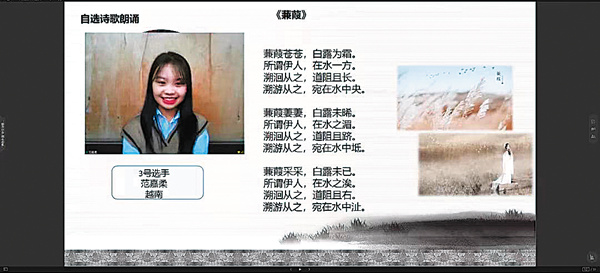

Oxana Saimo, a 36-year-old from France, says her interest in Chinese language and culture was boosted by the program.
"Teachers taught us knowledge from textbooks and introduced Chinese TV shows, newspaper articles and songs," Saimo says.
In order to accelerate cultural exchange, online activities including lectures, salons, and contests were held during the program.
At a salon held in October, international students shared their views on network buzzwords in China, like neijuan, meaning "involution", to express a feeling of burnout by the younger generation.
It's not merely about the words, Saimo says, but about examining "new social phenomena in China through the contest".
"During my postgraduate study in teaching Chinese as a foreign language in Dalian, Liaoning province, 16 years ago, I noticed that Chinese society is quite competitive-children study hard in the hope of having a bright and prosperous future and parents expect their children to participate in numerous extracurricular activities," she adds.
"During the program at East China Normal University, however, learning about those buzzwords changed my previous understanding. Some parents in China now prefer not to compete with others, but rather let their children grow naturally and participate in activities they like."
The experience boosted Saimo's interest in Chinese culture and she decided to re-read some of the country's classic novels to gain a greater knowledge about Chinese traditions.
"Many students in the programs said Chinese cultural products, such as songs and domestic apps, have been popular in their hometown, aside from the language," Huang says.
"As China becomes one of the largest economies in the world, Chinese-language ability has been an advantage for career development. In feedbacks to the program from international students, many revealed that their jobs will be associated with Chinese language," she says.
That is the case for Malyshava. She works as a freelance translator in both Chinese to Russian and English to Russian translation. She had her first experience of simultaneous Russian-Chinese interpretation in January at a conference celebrating the 30th anniversary of the establishment of diplomatic relations between China and Belarus, with broader knowledge gained through the program.
In addition, Prescott Kate Lynn Hewell, a science teacher at a secondary school in the United Kingdom and founder of a Chinese-language club there, plans to study international Chinese education further by studying for a master's degree at East China Normal University.
Hewell hopes that, after graduation, she can expand the influence of the language as a Chinese teacher for local children.
Saimo, who is working as a community manager at the World Economic Forum in Geneva, Switzerland, is also determined to contribute to the development of relationship between China and Europe.
"The demand for employees who can master the language has been on the rise significantly in overseas Chinese companies and foreign-funded enterprises with business interests in China, as international cooperation has been strengthened," Huang says.
"Therefore, the incorporation of Chinese-language courses into professional education has become a requirement for talent cultivation in many countries," she says.
According to Huang, "Chinese+"educational programs have reached many fields of professional learning, such as transportation, economy, agriculture, tourism and law.
"It is widely welcomed by international students and will drive economic development in the post-pandemic era," she adds.